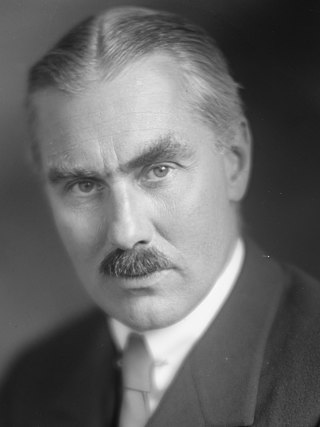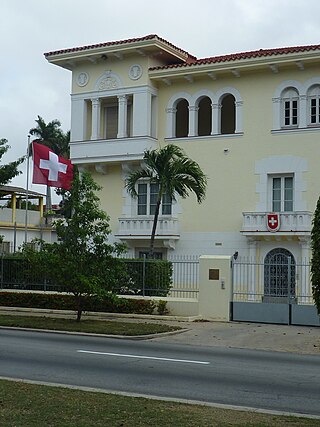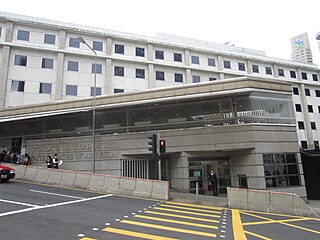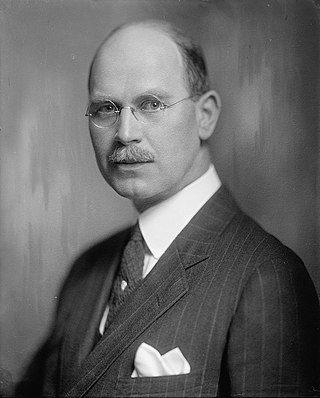
A diplomatic mission or foreign mission is a group of people from a state or organization present in another state to represent the sending state or organization officially in the receiving or host state. In practice, the phrase usually denotes an embassy or high commission, which is the main office of a country's diplomatic representatives to another country; it is usually, but not necessarily, based in the receiving state's capital city. Consulates, on the other hand, are smaller diplomatic missions that are normally located in major cities of the receiving state. As well as being a diplomatic mission to the country in which it is situated, an embassy may also be a nonresident permanent mission to one or more other countries.

The United States Department of State (DOS), or simply the State Department, is an executive department of the U.S. federal government responsible for the country's foreign policy and relations. Equivalent to the ministry of foreign affairs of other nations, its primary duties are advising the U.S. president on international relations, administering diplomatic missions, negotiating international treaties and agreements, and representing the U.S. at the United Nations. The department is headquartered in the Harry S Truman Building, a few blocks from the White House, in the Foggy Bottom neighborhood of Washington, D.C.; "Foggy Bottom" is thus sometimes used as a metonym.

Ambassadors of the United States are persons nominated by the president to serve as the country's diplomatic representatives to foreign nations, international organizations, and as ambassadors-at-large. Under Article II, Section 2 of the U.S. Constitution, their appointment must be confirmed by the United States Senate; while an ambassador may be appointed during a recess, they can serve only until the end of the next session of Congress, unless subsequently confirmed.

The United States Foreign Service is the primary personnel system used by the diplomatic service of the United States federal government, under the aegis of the United States Department of State. It consists of over 13,000 professionals carrying out the foreign policy of the United States and aiding U.S. citizens abroad. Its current director general is Marcia Bernicat.

The Bureau of Diplomatic Security, commonly known as Diplomatic Security (DS), is the security branch of the United States Department of State. It conducts international investigations, threat analysis, cyber security, counterterrorism, and protection of people, property, and information. Its mission is to provide a safe and secure environment for officials to execute the foreign policy of the United States.

Joseph Clark Grew was an American career diplomat and Foreign Service officer. He is best known as the ambassador to Japan from 1932 to 1941 and as a high official in the State Department in Washington from 1944 to 1945. He opposed American hardliners, sought to avoid war, and helped to ensure the soft Japanese surrender in 1945 that enabled a peaceful American occupation of Japan after the war.
Diplomatic rank is a system of professional and social rank used in the world of diplomacy and international relations. A diplomat's rank determines many ceremonial details, such as the order of precedence at official processions, table seatings at state dinners, the person to whom diplomatic credentials should be presented, and the title by which the diplomat should be addressed.
The Foreign Agricultural Service (FAS) is the foreign affairs agency with primary responsibility for the United States Department of Agriculture's (USDA) overseas programs – market development, international trade agreements and negotiations, and the collection of statistics and market information. It also administers the USDA's export credit guarantee and food aid programs and helps increase income and food availability in developing nations by mobilizing expertise for agriculturally led economic growth. The FAS mission statement reads, "Linking U.S. agriculture to the world to enhance export opportunities and global food security," and its motto is "Linking U.S. Agriculture to the World."

The Foreign Service Institute (FSI) is the United States federal government's primary training institution for members of the U.S. foreign service community, preparing American diplomats as well as other professionals to advance U.S. foreign policy objectives overseas and in Washington. FSI provides more than 800 courses—including up to 70 foreign languages—to more than 225,000 enrollees a year from the U.S. Department of State and more than 50 other government agencies and the military service branches. FSI is based at the George P. Shultz National Foreign Affairs Training Center in Arlington, Virginia.
Assistant Secretary of State (A/S) is a title used for many executive positions in the United States Department of State, ranking below the under secretaries. A set of six assistant secretaries reporting to the under secretary for political affairs manage diplomatic missions within their designated geographic regions, plus one assistant secretary dealing with international organizations and one equivalent as the coordinator/ambassador at large for counterterrorism. Assistant secretaries usually manage individual bureaus of the Department of State. When the manager of a bureau or another agency holds a title other than assistant secretary, such as "director", it can be said to be of "assistant secretary equivalent rank". Assistant secretaries typically have a set of deputies, referred to as deputy assistant secretaries (DAS).

A consul is an official representative of a government who resides in a foreign country to assist and protect citizens of the consul's country, and to promote and facilitate commercial and diplomatic relations between the two countries.

The Indian Foreign Service (IFS) is a civil service under the All India Services. It is the diplomatic service and a central civil service of the Government of India under the Ministry of External Affairs. The Foreign Secretary is the head of the service. Vinay Mohan Kwatra is the 34th and the current Foreign Secretary.

The Department of Foreign Affairs is the executive department of the Philippine government tasked to contribute to the enhancement of national security, protection of the territorial integrity and national sovereignty, to participate in the national endeavor of sustaining development and enhancing the Philippines' competitive edge, to protect the rights and promote the welfare of Filipinos overseas and to mobilize them as partners in national development, to project a positive image of the Philippines, and to increase international understanding of Philippine culture for mutually-beneficial relations with other countries.

A protecting power is a country that represents another sovereign state in a country where it lacks its own diplomatic representation. It is common for protecting powers to be appointed when two countries break off diplomatic relations with each other. The protecting power is responsible for looking after the protected power's diplomatic property and citizens in the hosting state. If diplomatic relations were broken by the outbreak of war, the protecting power will also inquire into the welfare of prisoners of war and look after the interests of civilians in enemy-occupied territory.

The Consulate General of the United States, Hong Kong and Macau, represents the United States in Hong Kong and Macau.
The United States Department of State, like other agencies of the U.S. federal government, gives civilian decorations for outstanding service, sacrifice, or heroism. The criteria for the awards are set down in 3 FAM 4820 - Foreign Affairs Manual, 3 FAM - Personnel, section 3 FAM 4800 Department Awards Program.

The Ministry of Foreign Affairs of the Republic of Serbia is the ministry in the government of Serbia which is in the charge of maintaining the consular affairs and foreign relations of Serbia. The current minister is Ivica Dačić, in office since 26 October 2022.

The Office of Foreign Missions (OFM) is a component of the United States Department of State to provide services to American diplomatic personnel abroad and foreign diplomats residing in the United States. It was created by the U.S. Congress to help implement the Foreign Missions Act of 1982, which provides the legal foundation for facilitating secure and efficient operations of U.S. missions abroad, and of foreign missions and international organizations in the U.S.; pursuant to the act, the OFM ensures all diplomatic benefits, privileges, and immunities are properly exercised in accordance with federal laws and international agreements.
Ruth A. Davis is an American diplomat. Davis served as the 24th director general of the United States Foreign Service. She is the first woman of color to be appointed as Director General of the Foreign Service and the first African-American Director of the Foreign Service Institute. In 2002, she became a career member of the Senior Foreign Service and a Career Ambassador. She was the Chief of Staff of the Africa Bureau of the U.S. Department of State.

Wilbur John Carr was an American diplomat. He was a leader in building a professional American diplomatic corps, cutting it loose from domestic politics. He was named one of three Great Civil Servants, along with William Hunter, and Alvey Augustus Adee.














